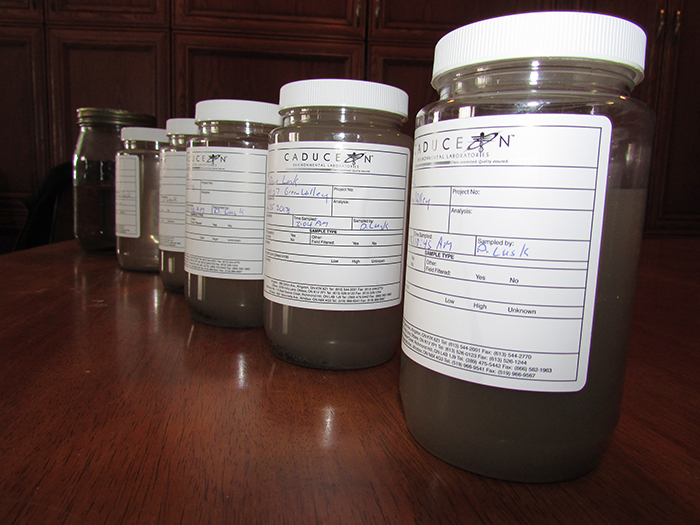
The Ford government has belatedly delivered its report on well water in North Kent, but it has done little to soothe concerns of those fighting for clean drinking water.
A five-person “expert” panel put together the report, an all-hazard investigation into well water quality in North Kent, near the North Kent 1 wind turbine farm.
The report stated the water quality was poor, and declined between 2017 and 2021 when the investigation took place. Construction on the turbine farm took place in 2017 and it went operational the following year.
The Ministry of Health report did not point a finger directly at the turbine farm as the cause of the problem, nor did it absolve the construction and operation of the turbines.
The report’s conclusions stated the general water quality in the study area is “rather poor as indicated by numerous exceedances.”
The report backed up claims by area well owners that there are issues with discoloration, odour, taste and sediment, particularly after 2017.
“This result is certainly consistent with well water interference having occurred within the study area since 2017, potentially due to construction and/or operation of the North Kent wind turbines,” the report stated.
The team also found that there are potential health risks associated with the drinking the water from these wells, as there are “concentrations of disease-causing organisms or unsafe concentrations of toxic chemicals in the water. Several contaminants of concern are identified in the tested well water from the study area, including lead, arsenic, and total coliforms.”
However it added that for most chemicals observed exceeding health-based criteria, typically only one well was determined to have elevated concentrations and those seemed to be only slightly over the provincial benchmark.
With that, the report said, “This would suggest a lack of wide-spread health concerns related to drinking water quality within the study area, based on the limited set of wells sampled to date.”
Kevin Jacubec, co-founder of Water Wells First, said the report falls short in many ways, including the fact potential health effects associated with what is transpiring in the area remain uninvestigated.
“The release of this all-hazard report is not at all the investigation type that Premier Ford agreed to do with me when he was making election promises (in 2017), “ Jacubec said in an e-mail to The Chatham Voice. “The promise made by Minister Monte McNaughton and the PC Party still remains a promise very much unfulfilled today.”
McNaughton, MPP for Lambton-Kent-Middlesex, whose riding includes the area of concern, when questioned by The Chatham Voice, repeatedly stressed more information is needed. He said the next steps involve expanding the investigation. And that means testing the water from more wells.
“One of the concerns that I have is that we had a low participation rate. But the Minister of Health will continue to take further action to do more investigating,” he said. “I encourage people who have concerns to participate. That’s the only way they are going to get answers. Step forward and let people go and test their water.”
Jacubec said the all-hazard report falls short.
“This investigation effort fell flat. It denied by design the participation of all the impacted families in Dover Township,” he said.
The report, suffered from poor participation. The Ministry of Health went with Englobe Corporation to handle the water sampling and testing. The company, according to report, ran into difficulties, as it sent out 309 surveys and received just 72 responses. Of those, 70 agreed to take part.
And for the second phase of sampling and testing, the report indicated Englobe officials had hoped for between 140 and 150 wells to be included, but only 21 participants took part.
The second phase included analysis for additional “inorganic parameters.”
The North Kent 1 wind farm has 34 turbines in the area. Construction took place in 2017, and the farm came online in 2018. Several residents have complained that pile driving during construction and vibration from active turbines has destroyed water quality in their wells.
The report concluded that sparse sampling and too many unknowns prevent linking the water quality to any short- or long-term health risks for drinking the water.
The panel recommends additional sampling be done to provide a larger base of data.
“The more complete data set and coverage would lead to more robust statistical analyses than are possible at present and could allow for a better understanding of the spatial distributions of contaminants and potential health risks,” it states.
Jacubec wants more.
“I call upon Premier Ford to have Minister David Piccini, Minister of the Ontario Ministry of Environment, Conservation and Parks to recognize publicly that water well interferences have occurred from the construction and operation of the North Kent Wind farm in Chatham-Kent,” he said.
In 2017, while sitting in Opposition at Queen’s Park, McNaughton took a harsh stance.
“I want the Minister to understand why communities are so troubled by the effect of wind turbines on their water,” said McNaughton in Question Period on Nov. 17, 2017, according to his own website. “Wells that have produced clean, clear water for decades have begun producing dirty brown, unpotable water since construction of turbines for the North Kent I wind project began.”
But when asked what recourse constituents plagued by sediment-choked water have, he reverted to encouraging them to take part in well water testing.
The report, dated December of 2021, was completed by Keith Benn, a professional geoscientist working in the minerals industry; Ronald Brecher, an independent consultant specializing in toxicology; Mark Chappel, who has nearly two decades of experience in human health toxicology; Glenn Ferguson, an environmental health scientist; and Shelley Harris, an associate professor of epidemiology and occupational and environment health.






